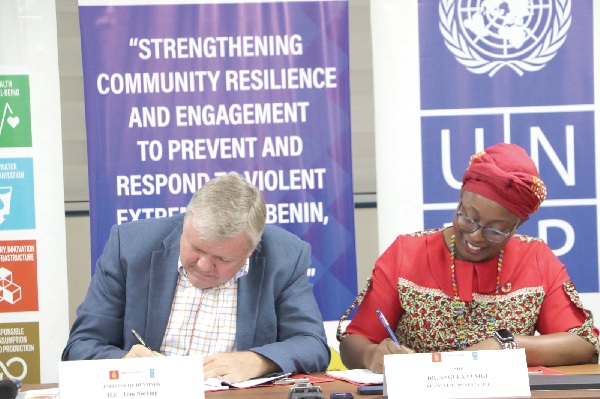
Curb cross border crimes to build vibrant economies in W/A
The Chief Director of the Ministry of the Interior, Adelaide Anno-Kumi, has said building vibrant and sound economies in the sub-region requires total elimination of cross border crimes and other illicit activities that hinder the success of the free trade currently being implemented by the Economic Community of West African States (ECOWAS).
“The prevailing economic and political stability in Ghana is attracting volumes of voluntary and forced migrants from other West African countries, especially Burkina Faso.The increasing numbers pose a security threat to us.
Unfortunately the majority of our land borders are porous, making them and border residents susceptible to threats such as trafficking of persons, drugs, small arms, light weapons and terrorism,” she said.
Mrs Anno-Kumi said this at the launch of a project on “Strengthening Community Resilience and Engagement to prevent and Respond to Violent Extremism in Benin, Côte d’Ivoire, Ghana and Togo.”
Project
The project, being implemented by the United Nations Development Programme (UNDP) in partnership with the Government of Denmark under its Peace and Stabilisation Fund (PSF), seeks to prevent and address the immediate localised drivers of radicalisation leading to violent extremism in target communities in Benin, Cote d’Ivoire, Ghana and Togo, while providing support to strengthening the ‘Infrastructure for Peace’, namely mechanisms for early warning and early response at the local level.
The project, among others, has sub-objectives of strengthening mechanisms and approaches for early warning and response to violent extremism in target locations and strengthening the socio-economic resilience of at-risk youth, women, and other vulnerable populations in target locations.
It will be implemented for a period of 18 month from July 2023 to December 2024.
She explained that activities of violent extremist organisations had since 2012 led to a deterioration of security and forced displacement in the West Africa Sub-region such that over 700,000 people have been forced to flee their homes as a result of insecurity in Burkina Faso alone.
She said violent extremist activities and terrorist attacks in some African countries, especially in neighbouring countries in the Sahel, always served as a threat of terrorism to Ghana.
She added that in order to protect citizens/residents of Ghana, and investments, necessary measures had been taken to preserve the safety and security in Ghana.
However, she said the measures taken required a determined, well defined, inter-agency coordination to combat the menace.
The Chief Director commended the Danish Embassy and the UNDP for sharing experiences on issues of common interest in the cross-border areas of Ghana, Benin, Cote d’Ivoire and Togo.
The Ambassador of Denmark to Ghana, Tom Nørring, said the situation in the northern part of the coastal states of West Africa was serious, however, if stakeholders could act now, they could contain the spill over of violent extremism from the Sahel Region.
He said “we can offer an alternative to the spread of the violent extremism which we have seen having a devastating impact in various parts of the Sahel region.”
“Together we can ensure that democracy, safety, freedom and an enabling environment for growth will continue to prevail in the communities in the northern parts of Benin, Cote d’Ivoire, Ghana and Togo. But we must act now and handle the threat as a matter of urgency,” he added.
UNDP’s response
The UNDP Resident Representative, Dr Angela Lusigi, said the country needed to move swiftly from analysis, strategy development, and siloed interventions to accelerating a well-coordinated response, as the landscape of violent extremism in West Africa grows increasingly complex.
To address emerging drivers of conflict by building community resilience and strengthening early warning and preventive actions, she called for a more integrated and robust sub-regional response that went beyond a securitised approach.
She emphasised UNDP’s response in supporting Ghana and its neighbouring countries through its Atlantic Corridor Initiative, which covered Benin, Burkina Faso, Cote d’Ivoire, Ghana, and Togo.
Dr Lusigi added that her outfit had supported Ghana to deepen understanding through a groundbreaking study on “Vulnerability to the Threat of Radicalization towards Violent Extremism in Northern Ghana”.
“In partnership with the Ministry of National Security through the National Fusion Centre we developed a vulnerability index and provided real insights into the nexus between environmental, social, and economic vulnerabilities and radicalization,” she said.